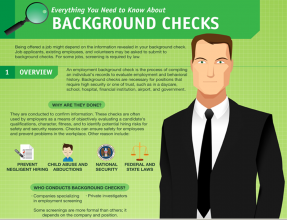A Guest post from LiveCareer

image courtesy www.backgroundcheck.org
If you’re regular job seeker just trying to make your way in a tough economy like the rest of us, chances are you haven’t committed a serious crime, and your past isn’t riddled with dark secrets. But you may have some issues with creditors (long-term unemployment can wreak havoc on our finances), etc. And you may be wondering how much influence the details of your past can have over your future. How long will you be haunted, for example, by a firing or lay-off? What are the odds that a previous employer will say negative things about you during a routine reference check? Can an unpaid parking ticket tank your job prospects?
In some cases, the answer will depend on the nature of the job you’re looking for. Some government positions require high level security clearance, and in cases like these, very little in your past will be safe from scrutiny. But most jobs don’t require this kind of review, and employers who peer too deeply into an applicant’s past may risk damaging their reputations and breaking their budgets on long, overcautious screening strategies. Some investigations are also illegal, and employers who pursue them may face fines, penalties, and the threat of civil lawsuits. Here’s a quick review of the most common types of inquiries.
Credit Checks
The Fair Credit Reporting Act, or FCRA, protects jobs seekers from discriminatory hiring practices based on credit history, and also protects the privacy of our financial information. All the same, some employers feel that credit information reflects a candidate’s sense of financial responsibility, which may be relevant to some positions.
Most wise employers leave credit information alone, but those who choose to investigate credit records may do so as long as they obtain written permission from the candidate. It’s within your rights to withhold this permission.
Criminal Background Checks and Health Records
Like credit records, criminal background information is protected to a limited extent. For some positions, employers have a responsibility to screen out candidates who have a history of violent behavior. But criminal background checks and health investigations are usually performed only with the written consent of the candidate, and they may typically only reveal medical or criminal information that’s directly relevant to the needs of the position.
Reference Checks
When you offer a list of references to a potential employer, create the list carefully. Those who are on the list may be asked in-depth questions about your personality and your performance on the job, and you want these people to shower you with praise. Former employers who are contacted without your specific written permission will usually offer only two pieces of unprotected information: Your dates of employment and the title of the position you held. Providing more than this can expose companies to lawsuits and other hassles which most of them would rather avoid.
Social Media
Companies who use internet search engines to make hiring decisions accept a host of legal risks. If Google reveals a photo of a candidate in a wheelchair, for example, then hiring managers find themselves in a difficult position, since they may face discrimination lawsuits if the candidate is ultimately rejected.
But at the same time, it’s common for employers to accept this risk and it’s perfectly legal for an employer to review any information about you that they find in a public venue. So make sure your social media privacy settings are carefully controlled, and remove all questionable pictures and text from public view.
What if an employer asks to “friend” or “follow” you in order to gain access to your Facebook profile or Twitter feed? The answer is up to you, but again, adjust your privacy settings before you click “accept”. NEVER provide a potential employer with profile passwords. This is an irresponsible and unethical request that can expose you to hacks and identity theft, at the very least. If an employer asks for personal passwords of any kind, politely decline and seek employment elsewhere.
Need general job search help or guidance with a specific employment situation? Visit Livecareer.com and explore our resume building tools, mock interview questions, and other career development resources.

